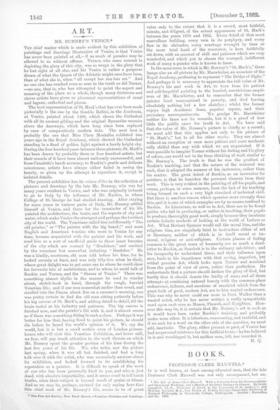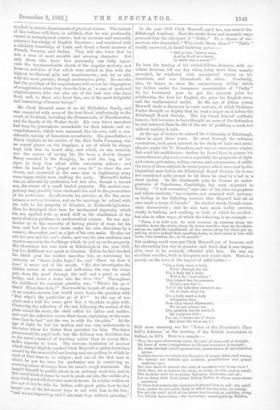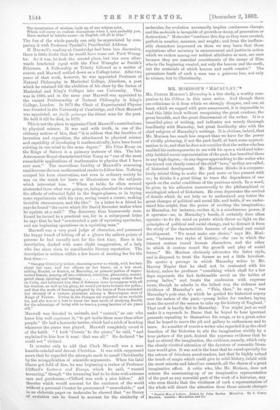BOOKS.
PROFESSOR CLERK MAXWELL.*
Pr is well known, at least among educated men, that the late Professor Clerk- Maxwell was not only unsurpassed, but un- 4' The Life of Jaws Cleik Mani:tit. With n Selection from his Correspondence and Occasional Writiugs, and a Sketch of his Contributions to Science. By Lewis Danupball, LL.D., Professor of Greek in the University of St. Andrew's; and Gurnott, M.A., late Follow of Trinity College, CaTeblielge, ProfeEser of Natural Philosophy iu University College, Nottingham. Loudon Macmillan and Oa, 1882.
rivalled, in certain departments of physical science. The readers of this volume will learn, in addition, that he was profoundly versed in metaphysical science ; had an accurate and unusually extensive knowledge of English literature ; and combined with a scholarly knowledge of Latin and Greek a fluent mastery of French, German, and Italian. They will also learn that he was a man of most amiable and winning character. But only those who knew him personally can fully appre- ciate the incommunicable charm of the singular modesty, and humour, and love of fun which were united in him with the highest intellectual gifts and acquirements ; and, let us add, with the most geuuiue, though unobtrusive, piety. No one who had the privilege of his acquaintance will accuse his biographers Of exaggeration when they describe hiru as " a man of profound original genius, who was also one of the best men who have lived, and, to those who knew him, one of the most delightful and interesting of human beings."
Mr. Clerk Maxwell came of an old Midlothian family, and was connected with some of the best blood intellectually in the south of Scotland, including the Drummonds, of Hawthornden, and the family of Sir Walter Scott. His own direct ancestors had been for generations remarkable for their talents and ac- complishments, which were seasoned, like his own, with a con- .siderable spicing of humorous eccentricity. His grandfather, a Naval Captain in the service of the East India Company, was an expert player on the bagpipes, a set of which he always kept with him on board ship, and which, on one occasion, was the means of saving his life from a double danger. Being wrecked in the Hooghly, he used the bag of his pipes to keep him afloat while swimming ashore ; and when he lauded ho "played an unco fit" to cheer the sur- vivors, and succeeded at the same time in frightening away some tigers which were stalking the party. Maxwell's father was an advocate by profession, but was also, though a second son, the owner of a small lauded property. His modest com- petency may possibly have slackened his zeal in the prosecution of his profession. At all events, his practice at the Bar never became a serious business, and on his marriage he retired with his wife to his property of Glenlair, in Kirkcudbrightshire. Here he developed that turn for mechanical ingenuity which his son applied with so much skill to the elucidation of the most abstruse problems in mathematical science. He was par- ticular as to the necessity of having plenty of room for his toes, and had his shoes made under his own directions by a country shoemaker, and on a last of his own make. He also cut out his own and his sows shirts, and was his own architect and master-mason in the buildings which he put up on his property. His illustrious son was born in Edinburgh in the year 1831, but his childhood was spout at Glenlair. Before he had reached his third year his mother describes him as exercising, his .curiosity on "doors, locks, keys," &c., and Show un how it doos ' is never out of his month. " Ho also investigates the hidden course of streams and bell-wires, the way the water gets from the pond through the wall and a pond, or small bridge, and down a drain into the river Orr." Throughout his childhood his constant question was, "What's the go o' that ? What does it do ?" Nor would he be put off with a- vague or an evasive answer, but would press home the question with But what's the particular go of it ? " At the age of two years and a half his nurse gave him a tin-plate to play with. Observing the reflection of the sun following the motion of the plate round the room, the child called his father and mother, -and sent the reflection across their faces, explaining at the same time that he had " got the sun in with the tin-plate." At the Age of eight he lost his mother, and was very unfortunate in the tutor whom his father then provided for him. The tutor pronounced his pupil dull ; but the dullness was doubtless due -to the tutor's method of teaching rather than to young Max- well's capacity to learn. The nervous hesitation of manner which always slightly marked Clerk Maxwell is said to have been -caused by the unmerciful ear-boxing and ear-pulling to which he used at that time to be subject ; and one of the first uses to which he put his turn for mechanics was in contriving an amusing means of escape from his tutor's rough treatment. He taught himself to paddle about in an ordinary wash-tub, and in this novel kind of canoe lie used to push out into the middle of a deep duck-pond till the tutor came to terms. In a letter written at the age of ten he tells his father, with great pride, how he had taught one of the labourers' boys to sail with him in the tub ; "and we are improving, and I can make it go without spinning." In the year 1841 Clerk Maxwell, aged ten, was sent to the Edinburgh Academy. Here his rustic dress and eccentric ways procured him the sobriquet of " Dafty." To a chorus of tor- mentors who demanded, "Who made those shoes " " Dafty " readily answered, in broad Galloway patois :— " Did ye ken, 'twas a man, And ho lived in a house, In whilk was a mouse P" He bore the teasing of his school-fellows, however, with ex- cellent humour, till one day when, being more than usually provoked, he retaliated with unexPected vigour on his
assailants, and was thenceforth let alone. Gradually, also, he began to show the extraordinary ability which lay hidden under the humorous eccentricities of " Dafty." In his fourteenth year lie got the eleventh prize for scholarship, the first for English, the prize for English verse, and the mathematical medal. At the ago of fifteen young Maxwell made a discovery in conic sections, of which Professor Forbes thought so highly that lie read a paper on it before the Edinburgh Royal Society. The boy found himself suddenly famous ; but he seems to have thought no more of the distinction. he had achieved than he did of the art of paddling a wash-tub without making it spin.
At the age of sixteen he entered the University of Edinburgh, where he spent three years. Ho went through the ordinary curriculum, took great interest in the study of logic and meta- physics under Sir W. Hamilton, and was an omnivorous reader. But amid his multifarious studies he found time to pursue his researches into physical science, especially the properties of light and colour, galvanism, rolling curves, and compression of solids. On some of these subjects he wrote papers which were read by dis- tinguished men before the Edinburgh Royal Society, for it was not considered quite proper to let them be read by a lad in a short jacket. In his nineteenth year he became an under- graduate of Peterhouse, Cambridge, but soon migrated to Trinity. "I well remember," says one of his twin biographers and fellow-students, " my surprise, not unmixed with jealousy, on finding in the following summer that Maxwell had all at once made a troop of friends." He studied much, though some- what discursively ; and he also took much bodily exercise, chiefly in bathing and sculling, in both of which ho excelled ; but also in other ways, of which the following is an example :—
" From 2 to 2.30 a.m. lie book exercise by running along the corridor, down the stairs, along the lower corridor, then up the stairs, and so on, until the inhabitants of the rooms along his track got up, and lay perdue behind their sporting doors, to have shots at him with boots, hair-brushes, &o., as lie passed."
But nothing could ever put Clerk Maxwell out of humour, and his abounding fun was so genuine and fresh that it was impos- sible ever to be seriously offended with him. He was an excellent versifier, both in the grave and comic style. Hera is a parody on the laws of the impact of solid bodies :- " Gin a body meet a body,
Flyin' through the air, Gin a body bit a body, Will it fly? and where P Ilka impact has its measure, No'or a ano hoe I ; Yet a' the lads they measure me, Or, at least, they try.
Gin a body meet a body Altogether free, How they travel afterwards,
We do not always see. Ilka problem has its method, By analytics high ;
For me, I konna one o' them. But what the waur am I ?
Still more amusing are his "Notes of the President's (Tyn- dall's) Address," at the meeting of the British Association in Belfast, in 1874. Here is a sample :—
" Thus the pure elementary atom, the unit of mass and of thought, By force of mere juxtaposition to life and sensation is brought ;
So, down through untold generations, transmission of structureless germs, Enables our race to inherit the thoughts of boasts, fishes, and worms. We honour our fathers apd mothers, grandfathers and grand- mothers, too; But how shall we honour the vista of ancestors now in our view ? First, then, let us honour the atom, so lively, so wise, and so small; The atomists next let us praise, Epicurus, Lucretius, and all ; Lot us damn with faint praise Bishop Butler, in whom many atoms combined
To form that remarkable structure it pleased him to call—his mind. Last, praise we the noble Body to which for the time we belong, Ere yet the swift whirl of the atoms has hurried us, ruthless, along, The British Association—like Leviathan, worshipped by Hobbes,
The incarnation of wisdom, built up of our witless nobs,
Which will carry on endless discussions when I, and probably you, Have melted in infinite azure—in English, till all is blue."
The fun of the whole parody can only be appreciated by com- paring it with Professor Tyndall's Presidential Address.
If Maxwell's reading at Cambridge had been less discursive, there is little doubt that he would have come out First Wrang- ler. As it was, he took the second place, but was soon after- wards bracketed equal with the First Wrangler as Smith's Prizeman. A Fellowship at Trinity followed as a matter of course, and Maxwell settled down as a College tutor. After two years of that work, however, he was appointed Professor of Natural Philosophy in Marischal College, Aberdeen, a post which he retained till the abolition of his chair by the fusion of Marischal and King's Colleges into one University. This was in 1860, and in the same year Maxwell was appointed to the vacant Professorship of Natural Philosophy in King's College, London. In 1871 the Chair of Experimental Physics was founded in the University of Cambridge, and Clerk Maxwell was appointed, as facile princeps the fittest man for the post. He held it till he died, in 1879.
This is not the place to appraise Clerk Maxwell's contributions to physical science. It was said with truth, in one of the obituary notices of him, that " it is seldom that the faculties of invention and exposition, the attachment to physical science and capability of developing it mathematically, have been found existing in one mind to the same degree." His Prize Essay on the Rings of Saturn is a palmary instance of this. The late Astronomer-Royal characterised that Essay as " one of the most remarkable applications of mathematics to physics that I have ever seen." The marvellous lucidity of Maxwell's reasoning enables even the non-mathematical reader to follow him. Nothing escaped his keen observation, and even in ordinary society he was on the watch for hints or illustrations on the subjects which interested him. " When at table, he often seemed abstracted from what was going on, being absorbed in observing the effects of refracted light in the finger-glasses, or in trying some experiments with his eyes, seeing round a corner, making
invisible stereoscopes, and the like." In a letter to a friend he says he found" the curve which Sir Davie} 13rewster makes when he squints at a wall." The discovery thus humorously men- tioned he turned to a practical use, for in a subsequent letter he says that he had " constructed a pair of squinting spectacles, and am beginning operations on a squinting man."
Maxwell was a very good judge of character, and possessed the happy knack of hitting off at a glance the salient points of persons he had casually met for the first time. Here is his description, dashed with some slight exaggeration, of a lady who has since risen to considerable literary reputation. The description is written within a few hours of meeting her for the first time :—
" One gay litter(ar)y widow, charming never so wisely, with her hair about her ears, and her elbows on her knees, on a low stool, talking Handel, or Buskin, or Macaulay, or general pathos of unpro- tected female, passing off into criticism, witticism, pleasantry, unmiti- gated slang, sporting and betting The young widow fixed on Colin, and informed him that if Solomon were to reappear with all his wisdom, as well as his glory, he would yet have to learn the polka ; and that the mode of feasting adopted by the Incas of Peru reminded her strongly of a custom prevalent among a Merovingian race of Kings of France. Living in the Pampas she regarded as an enviable lot, and she was at a loss to know the best mode of studying Euclid, for the advantage of being able to teach a young brother of six years old."
Maxwell was devoted to animals, and " seemed," as one who knew him well expresses it, " to get inside them more than other people." He had a favourite terrier, which had a trick of howling whenever the piano was played. Maxwell completely cured it of the habit. " I took ' Coonie ' to the piano," he said, " and explained to him how it went : that was all." He declared " he could not " vivisect.
It remains only to add that Clerk Maxwell was a mos humble-minded and devout Christian. It was with suppressed scorn that he regarded the attempts made to assail Christianity by the misapplication of scientific arguments. When his fatal illness got hold of him, he was beginning a review of Professor Clifford's Lectures and Essays, which he said, " wanted trouncing," though " the trouncing had to be done with extreme care and gentleness,—Clifford was such a nice fellow.' All theories which would account for the existence of the world without a personal Creator ho pronounced " unworkable;" and in an elaborate paper on molecules he showed that "no theory of evolution can be found to account for the similarity of molecules, for evolution necessarily implies continuous change, and the molecule is incapable of growth or decay, of' generation or destruction." Molecules "continue this day as they were created, perfect in number, measure, and weight ; and from the inefface- able characters impressed on them we may learn that those aspirations after accuracy in measurement and justice in action which we reckon among our noblest attributes as men, are ours because they are essential constituents of the image of Him who in the beginning created, not only the heaven and the earth, but the materials of which heaven and earth consist." The premature death of such a man was a grievous loss, not only to science, but to Christianity.








































 Previous page
Previous page